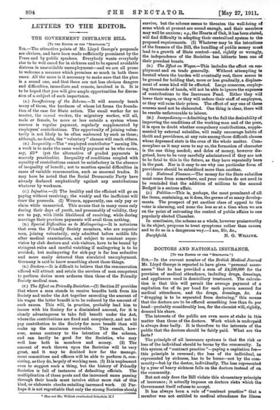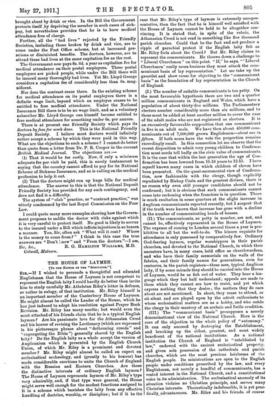DOCTORS AND NATIONAL INSURANCE.
[To SHE EDITOR OF THE " SPECTATOR:1
Sin,—In the current number of the British Medical Journal Mr. Lloyd George is reported to have given "personal assur- ances" that he has provided a sum of £4,200,000 for the provision of medical attendance, including drugs, dressings, and appliances used in domiciliary treatment. The calcula- tion is that this will permit the average payment of a capitation fee of 6s. per head for each person assured for medical attendance, and the drugs, dressings, &c. As " drugging is to be separated from doctoring," this means that the doctors are to be offered something less than 6s. per head—probably considerably less, for the chemist will, rightly, demand his share.
The interests of the public are even more at stake in this matter than those of the doctors. Work which is underpaid is always done badly. It is therefore to the interests of the public that the doctors should be fairly paid. What are the facts ?
The principle of all insurance systems is that the risk or loss of the individual should be borne by the community. In this system of "contract practice "—paying a capitation fee— this principle is reversed; the loss of the individual, as represented by sickness, has to be borne—not by the com- munity—but by the doctor, individually. The loss represented by a year of heavy sickness falls on the doctors instead of on the community.
But not only does the Bill violate this elementary principle of insurance ; it actually imposes on doctors risks which the Government itself refuses to accept.
It has always been a rule of "contract practice" that a member was not entitled to medical attendance for illness brought about by drink or vice. In the Bill the Government protects itself by depriving the member in such cases of sick- pay, but nevertheless provides that he is to have medical attendance free of charge.
Further, all the " bad lives " rejected by the Friendly Societies, including those broken by drink and vice, are to come under the Post Office scheme, but at increased pre- miums or diminished benefits. The doctors, however, are to attend these bad lives at the same capitation fee as the rest.
The Government now pays 8s. 6d. a year as capitation fee for medical attendance on their postal employees. These postal employees are picked people, while under the Bill there will be insured many thoroughly bad lives. Yet Mr. Lloyd George considers a capitation fee of considerably less than 6s. mag- nificent.
Nor does the contrast cease there. In the existing scheme for medical attendance on its postal employees there is a definite wage limit, beyond which an employee ceases to be entitled to free medical attendance. Under the National Insurance Bill there is to be no wage limit, and as a voluntary subscriber Mr. Lloyd George can himself become entitled to free medical attendance for something under Os. per annum.
There is at present one Friendly Society which pays its doctors by fees for work done. This is the National Friendly Deposit Society. I believe most doctors would infinitely rather accept a scheme by which they were paid in this way. What are the objections to such a scheme ? I cannot do better than quote from a letter from Dr. P. R. Cooper in the current British Medieal Journal. The objections are :— (1) That it would be too costly. Now, if only a minimum adequate fee per visit be paid, this is surely tantamount to saying that the country cannot afford to pay for its National Scheme of Sickness Insurance, and so is calling on the medical profession to help it out.
(2) That the doctors might run up huge bills for medical attendance. The answer to this is that the National Deposit Friendly Society has provided for any such contingency, and does not find it a difficulty.
The system of " club " practice, or "contract practice," was utterly condemned by the last Royal Commission on the Poor Law.
I could quote many more examples showing how the Govern- ment proposes to saddle the doctor with risks against which it is very careful to protect itself. No good is likely to accrue to the insured under a Bill which inflicts injustices in so brazen a manner. You, Sir, often ask " What will it cost ? Where is the money to come from ? " I think in this case the true answers are " Don't :now " and " From the doctors."—I am,











































 Previous page
Previous page